
AutoAgents
A multi-agent framework written in Rust that enables you to build, deploy, and coordinate multiple intelligent agents
Stars: 360
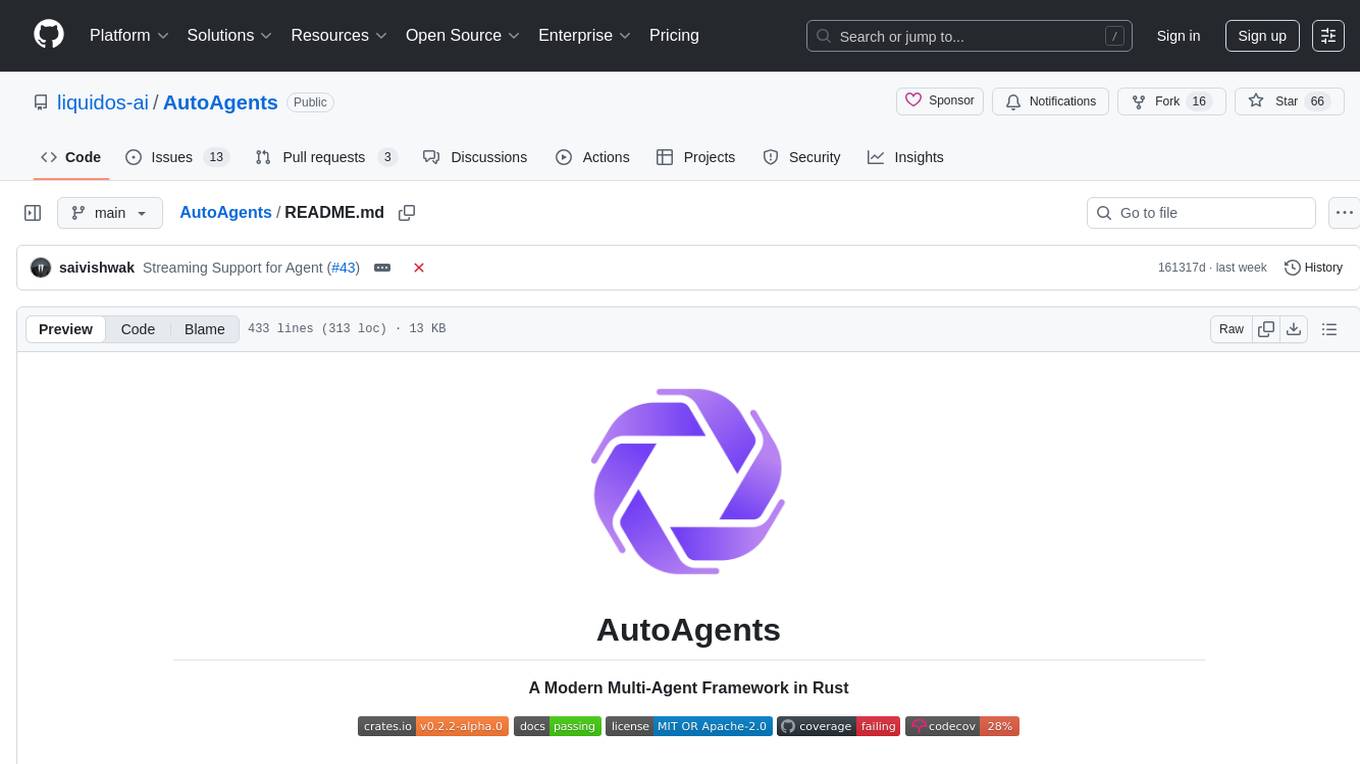
AutoAgents is a cutting-edge multi-agent framework built in Rust that enables the creation of intelligent, autonomous agents powered by Large Language Models (LLMs) and Ractor. Designed for performance, safety, and scalability. AutoAgents provides a robust foundation for building complex AI systems that can reason, act, and collaborate. With AutoAgents you can create Cloud Native Agents, Edge Native Agents and Hybrid Models as well. It is so extensible that other ML Models can be used to create complex pipelines using Actor Framework.
README:
AutoAgents is a cutting-edge multi-agent framework built in Rust that enables the creation of intelligent, autonomous agents powered by Large Language Models (LLMs) and Ractor. Designed for performance, safety, and scalability. AutoAgents provides a robust foundation for building complex AI systems that can reason, act, and collaborate. With AutoAgents you can create Cloud Native Agents, Edge Native Agents and Hybrid Models as well. It is built with a modular architecture with swappable components, Memory layer, Executors can be easily swapped without much rework. With our native WASM compilation support, You can depoloy the agent orchestration directly to Web Browser.
- Multiple Executors: ReAct (Reasoning + Acting) and Basic executors with streaming support
- Structured Outputs: Type-safe JSON schema validation and custom output types
- Memory Systems: Configurable memory backends (sliding window, persistent storage - Coming Soon)
- TTS: Out of the support for Text to Speech with Realtime Playback
- Custom Tools: Easy integration with derive macros
- WASM Runtime for Tool Execution: Sandboxed tool execution
- Provider Agnostic: Support for OpenAI, Anthropic, Ollama, and local models
- Multi-Platform: Native Rust, WASM for browsers, and server deployments
- Multi-Agent: Type-safe pub/sub communication and agent orchestration
- Telemetry: OpenTelemetry tracing + metrics with pluggable exporters
- Native: High-performance server and desktop applications
- Browser: Run agents directly in web browsers via WebAssembly (Coming Soon!)
- Edge: Local inference with Llamacpp
AutoAgents supports a wide range of LLM providers, allowing you to choose the best fit for your use case:
| Provider | Status |
|---|---|
| OpenAI | ✅ |
| OpenRouter | ✅ |
| Anthropic | ✅ |
| DeepSeek | ✅ |
| xAI | ✅ |
| Phind | ✅ |
| Groq | ✅ |
| ✅ | |
| Azure OpenAI | ✅ |
| Provider | Status |
|---|---|
| Ollama | ✅ |
| Mistral-rs | ✅ |
| Llama-Cpp | ✅ |
Checkout https://github.com/liquidos-ai/AutoAgents-Experimental-Backends
| Provider | Status |
|---|---|
| Burn | |
| Onnx |
Provider support is actively expanding based on community needs.
For contributing to AutoAgents or building from source:
- Rust (latest stable recommended)
- Cargo package manager
- LeftHook for Git hooks management
macOS (using Homebrew):
brew install lefthookLinux/Windows:
# Using npm
npm install -g lefthook# Clone the repository
git clone https://github.com/liquidos-ai/AutoAgents.git
cd AutoAgents
# Install Git hooks using lefthook
lefthook install
# Build the project
cargo build --release
# Run tests to verify setup
cargo test --all-featuresThe lefthook configuration will automatically:
- Format code with
cargo fmt - Run linting with
cargo clippy - Execute tests before commits
use autoagents::core::agent::memory::SlidingWindowMemory;
use autoagents::core::agent::prebuilt::executor::{ReActAgent, ReActAgentOutput};
use autoagents::core::agent::task::Task;
use autoagents::core::agent::{AgentBuilder, AgentDeriveT, AgentOutputT, DirectAgent};
use autoagents::core::error::Error;
use autoagents::core::tool::{ToolCallError, ToolInputT, ToolRuntime, ToolT};
use autoagents::llm::LLMProvider;
use autoagents::llm::backends::openai::OpenAI;
use autoagents::llm::builder::LLMBuilder;
use autoagents_derive::{agent, tool, AgentHooks, AgentOutput, ToolInput};
use serde::{Deserialize, Serialize};
use serde_json::Value;
use std::sync::Arc;
#[derive(Serialize, Deserialize, ToolInput, Debug)]
pub struct AdditionArgs {
#[input(description = "Left Operand for addition")]
left: i64,
#[input(description = "Right Operand for addition")]
right: i64,
}
#[tool(
name = "Addition",
description = "Use this tool to Add two numbers",
input = AdditionArgs,
)]
struct Addition {}
#[async_trait]
impl ToolRuntime for Addition {
async fn execute(&self, args: Value) -> Result<Value, ToolCallError> {
println!("execute tool: {:?}", args);
let typed_args: AdditionArgs = serde_json::from_value(args)?;
let result = typed_args.left + typed_args.right;
Ok(result.into())
}
}
/// Math agent output with Value and Explanation
#[derive(Debug, Serialize, Deserialize, AgentOutput)]
pub struct MathAgentOutput {
#[output(description = "The addition result")]
value: i64,
#[output(description = "Explanation of the logic")]
explanation: String,
#[output(description = "If user asks other than math questions, use this to answer them.")]
generic: Option<String>,
}
#[agent(
name = "math_agent",
description = "You are a Math agent",
tools = [Addition],
output = MathAgentOutput,
)]
#[derive(Default, Clone, AgentHooks)]
pub struct MathAgent {}
impl From<ReActAgentOutput> for MathAgentOutput {
fn from(output: ReActAgentOutput) -> Self {
let resp = output.response;
if output.done && !resp.trim().is_empty() {
// Try to parse as structured JSON first
if let Ok(value) = serde_json::from_str::<MathAgentOutput>(&resp) {
return value;
}
}
// For streaming chunks or unparseable content, create a default response
MathAgentOutput {
value: 0,
explanation: resp,
generic: None,
}
}
}
pub async fn simple_agent(llm: Arc<dyn LLMProvider>) -> Result<(), Error> {
let sliding_window_memory = Box::new(SlidingWindowMemory::new(10));
let agent_handle = AgentBuilder::<_, DirectAgent>::new(ReActAgent::new(MathAgent {}))
.llm(llm)
.memory(sliding_window_memory)
.build()
.await?;
println!("Running simple_agent with direct run method");
let result = agent_handle.agent.run(Task::new("What is 1 + 1?")).await?;
println!("Result: {:?}", result);
Ok(())
}
#[tokio::main]
async fn main() -> Result<(), Error> {
// Check if API key is set
let api_key = std::env::var("OPENAI_API_KEY").unwrap_or("".into());
// Initialize and configure the LLM client
let llm: Arc<OpenAI> = LLMBuilder::<OpenAI>::new()
.api_key(api_key) // Set the API key
.model("gpt-4o") // Use GPT-4o-mini model
.max_tokens(512) // Limit response length
.temperature(0.2) // Control response randomness (0.0-1.0)
.build()
.expect("Failed to build LLM");
let _ = simple_agent(llm).await?;
Ok(())
}AutoAgents CLI helps in running Agentic Workflows from YAML configurations and serves them over HTTP. You can check it out at https://github.com/liquidos-ai/AutoAgents-CLI.
Explore our comprehensive examples to get started quickly:
Demonstrates various examples like Simple Agent with Tools, Very Basic Agent, Edge Agent, Chaining, Actor Based Model, Streaming and Adding Agent Hooks.
Demonstrates how to integrate AutoAgents with the Model Context Protocol (MCP).
Demonstrates how to integrate AutoAgents with the Mistral-rs for Local Models.
Demonstrates various design patterns like Chaining, Planning, Routing, Parallel and Reflection.
Contains examples demonstrating how to use different LLM providers with AutoAgents.
A simple agent which can run tools in WASM runtime.
A sophisticated ReAct-based coding agent with file manipulation capabilities.
Run AutoAgents Speech Example with realtime TTS.
Example App that runs AutoAgents with Local models in Android using AutoAgents-llamacpp backend
AutoAgents is built with a modular architecture:
AutoAgents/
├── crates/
│ ├── autoagents/ # Main library entry point
│ ├── autoagents-core/ # Core agent framework
│ ├── autoagents-protocol/ # Shared protocol/event types
│ ├── autoagents-llm/ # LLM provider implementations
│ ├── autoagents-telemetry/ # OpenTelemetry integration
│ ├── autoagents-toolkit/ # Collection of Ready to use Tools
│ ├── autoagents-mistral-rs/ # LLM provider implementations using Mistral-rs
│ ├── autoagents-llamacpp/ # LLM provider Implementation using LlamaCpp
│ ├── autoagents-speech/ # Speech Model support for TTS and STT
│ ├── autoagents-qdrant/ # Qdrant vector store
│ ├── autoagents-test-utils/ # Common test utils
│ └── autoagents-derive/ # Procedural macros
├── examples/ # Example implementations
- Agent: The fundamental unit of intelligence
- Environment: Manages agent lifecycle and communication
- Memory: Configurable memory systems
- Tools: External capability integration
- Executors: Different reasoning patterns (ReAct, Chain-of-Thought)
For development setup instructions, see the Installation section above.
# Run all tests --
cargo test --all-features
# Run tests with coverage (requires cargo-tarpaulin)
cargo install cargo-tarpaulin
cargo tarpaulin --all-features --out htmlThis project uses LeftHook for Git hooks management. The hooks will automatically:
- Format code with
cargo fmt --check - Run linting with
cargo clippy -- -D warnings - Execute tests with
cargo test --all-features --workspace --exclude autoagents-burn
We welcome contributions! Please see our Contributing Guidelines and Code of Conduct for details.
- API Documentation: Complete Framework Docs
- Examples: Practical implementation examples
- GitHub Issues: Bug reports and feature requests
- Discussions: Community Q&A and ideas
- Discord: Join our Discord Community using https://discord.gg/zfAF9MkEtK
AutoAgents is designed for high performance:
- Memory Efficient: Optimized memory usage with configurable backends
- Concurrent: Full async/await support with tokio
- Scalable: Horizontal scaling with multi-agent coordination
- Type Safe: Compile-time guarantees with Rust's type system
AutoAgents is dual-licensed under:
- MIT License (MIT_LICENSE)
- Apache License 2.0 (APACHE_LICENSE)
You may choose either license for your use case.
Built with ❤️ by the Liquidos AI team and our amazing community contributors.
Special thanks to:
- The Rust community for the excellent ecosystem
- OpenAI, Anthropic, and other LLM providers for their APIs
- All contributors who help make AutoAgents better
⭐ Star us on GitHub | 🐛 Report Issues | 💬 Join Discussions
For Tasks:
Click tags to check more tools for each tasksFor Jobs:
Alternative AI tools for AutoAgents
Similar Open Source Tools

AutoAgents
AutoAgents is a cutting-edge multi-agent framework built in Rust that enables the creation of intelligent, autonomous agents powered by Large Language Models (LLMs) and Ractor. Designed for performance, safety, and scalability. AutoAgents provides a robust foundation for building complex AI systems that can reason, act, and collaborate. With AutoAgents you can create Cloud Native Agents, Edge Native Agents and Hybrid Models as well. It is so extensible that other ML Models can be used to create complex pipelines using Actor Framework.
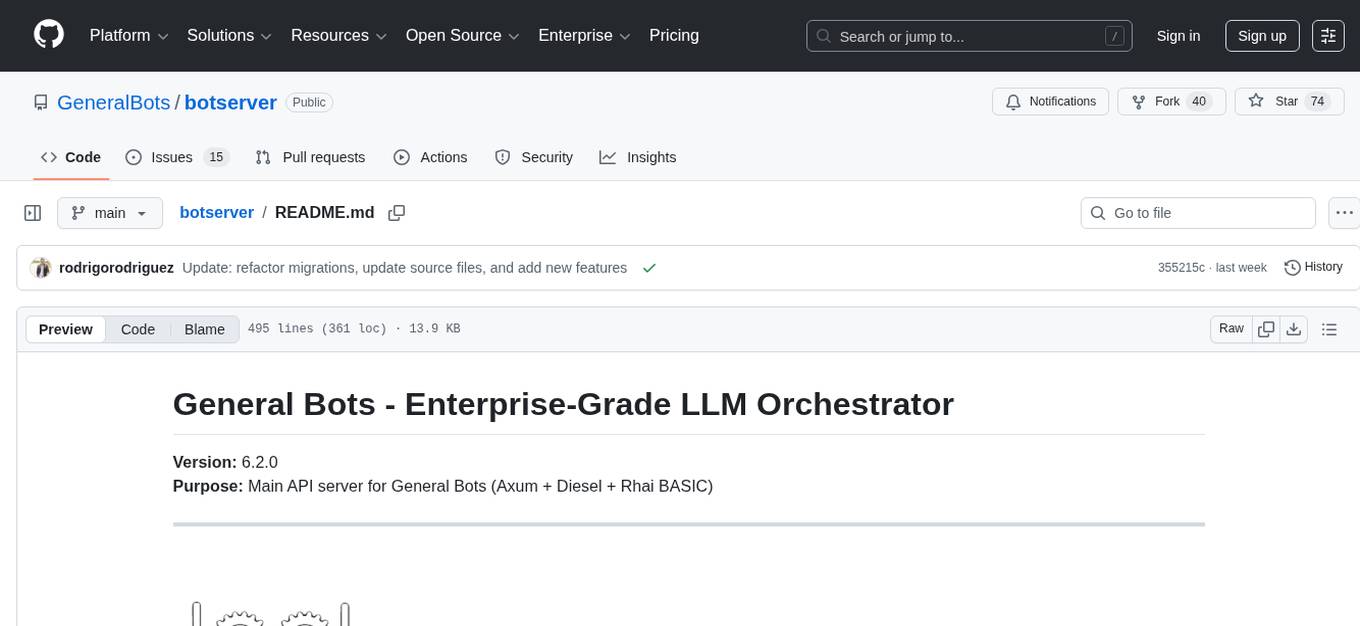
botserver
General Bots is a self-hosted AI automation platform and LLM conversational platform focused on convention over configuration and code-less approaches. It serves as the core API server handling LLM orchestration, business logic, database operations, and multi-channel communication. The platform offers features like multi-vendor LLM API, MCP + LLM Tools Generation, Semantic Caching, Web Automation Engine, Enterprise Data Connectors, and Git-like Version Control. It enforces a ZERO TOLERANCE POLICY for code quality and security, with strict guidelines for error handling, performance optimization, and code patterns. The project structure includes modules for core functionalities like Rhai BASIC interpreter, security, shared types, tasks, auto task system, file operations, learning system, and LLM assistance.
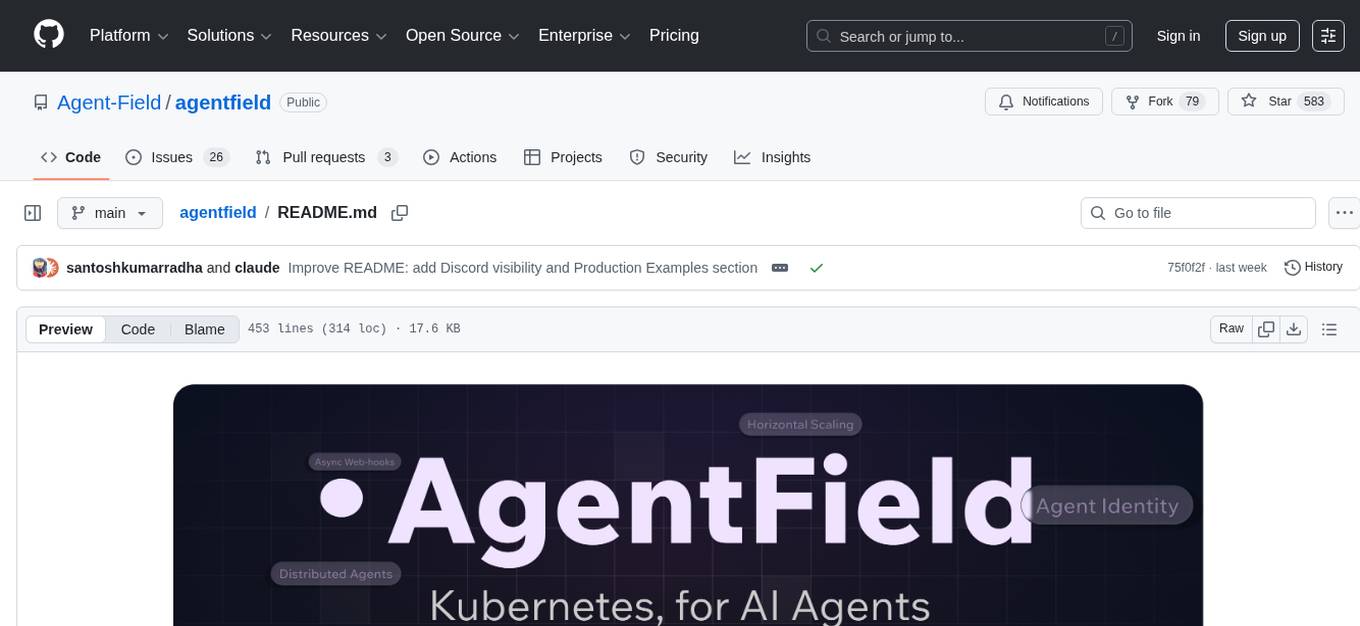
agentfield
AgentField is an open-source control plane designed for autonomous AI agents, providing infrastructure for agents to make decisions beyond chatbots. It offers features like scaling infrastructure, routing & discovery, async execution, durable state, observability, trust infrastructure with cryptographic identity, verifiable credentials, and policy enforcement. Users can write agents in Python, Go, TypeScript, or interact via REST APIs. The tool enables the creation of AI backends that reason autonomously within defined boundaries, offering predictability and flexibility. AgentField aims to bridge the gap between AI frameworks and production-ready infrastructure for AI agents.
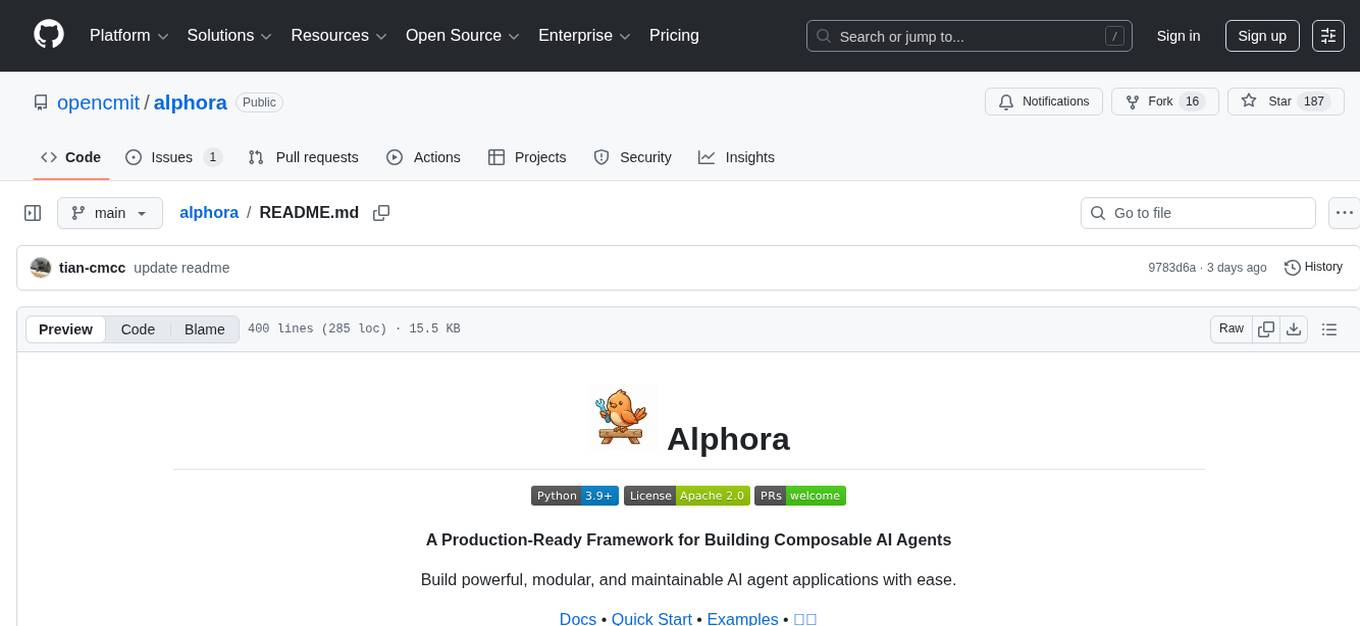
alphora
Alphora is a full-stack framework for building production AI agents, providing agent orchestration, prompt engineering, tool execution, memory management, streaming, and deployment with an async-first, OpenAI-compatible design. It offers features like agent derivation, reasoning-action loop, async streaming, visual debugger, OpenAI compatibility, multimodal support, tool system with zero-config tools and type safety, prompt engine with dynamic prompts, memory and storage management, sandbox for secure execution, deployment as API, and more. Alphora allows users to build sophisticated AI agents easily and efficiently.
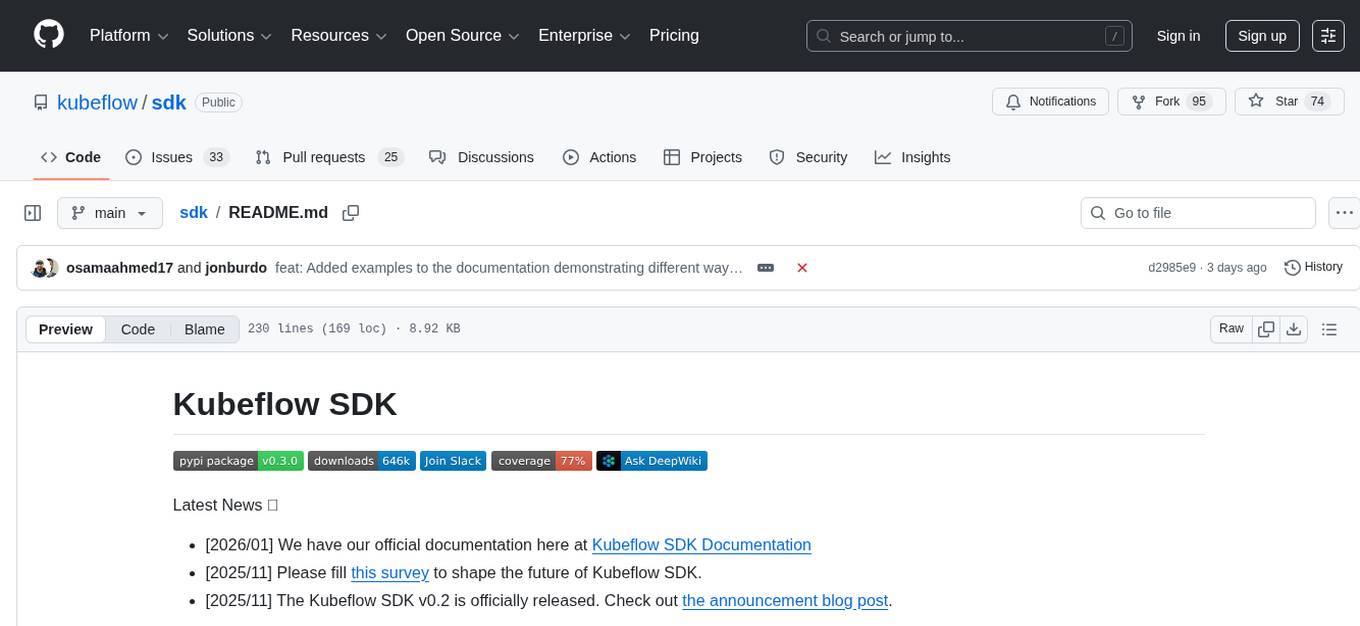
sdk
The Kubeflow SDK is a set of unified Pythonic APIs that simplify running AI workloads at any scale without needing to learn Kubernetes. It offers consistent APIs across the Kubeflow ecosystem, enabling users to focus on building AI applications rather than managing complex infrastructure. The SDK provides a unified experience, simplifies AI workloads, is built for scale, allows rapid iteration, and supports local development without a Kubernetes cluster.
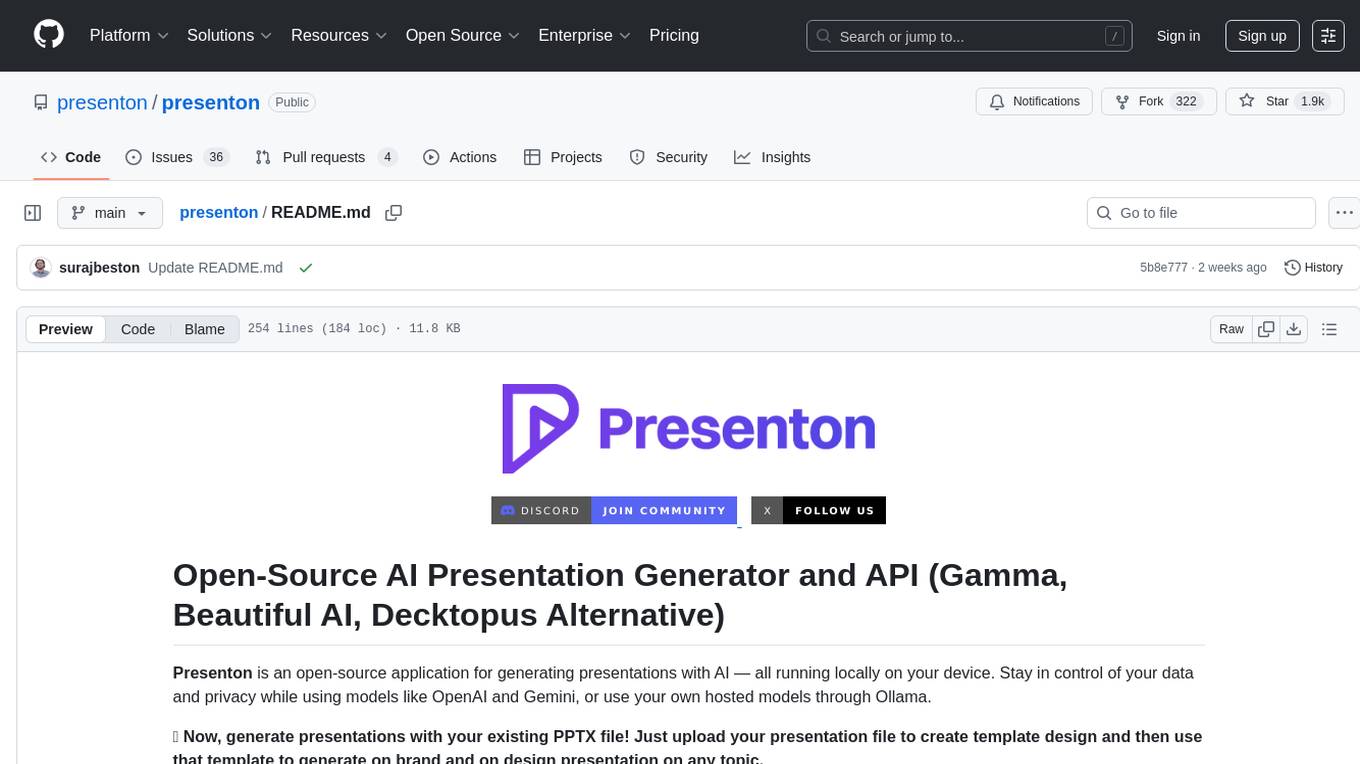
presenton
Presenton is an open-source AI presentation generator and API that allows users to create professional presentations locally on their devices. It offers complete control over the presentation workflow, including custom templates, AI template generation, flexible generation options, and export capabilities. Users can use their own API keys for various models, integrate with Ollama for local model running, and connect to OpenAI-compatible endpoints. The tool supports multiple providers for text and image generation, runs locally without cloud dependencies, and can be deployed as a Docker container with GPU support.
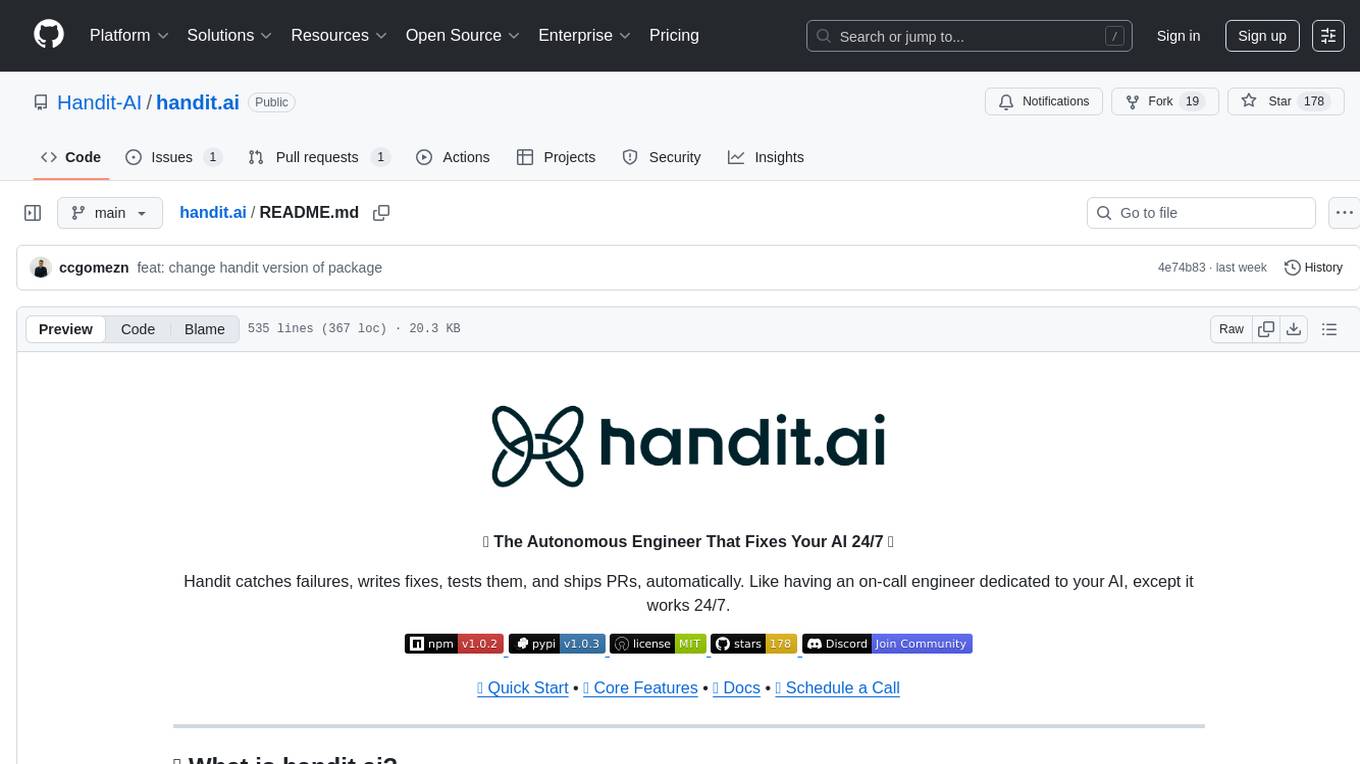
handit.ai
Handit.ai is an autonomous engineer tool designed to fix AI failures 24/7. It catches failures, writes fixes, tests them, and ships PRs automatically. It monitors AI applications, detects issues, generates fixes, tests them against real data, and ships them as pull requests—all automatically. Users can write JavaScript, TypeScript, Python, and more, and the tool automates what used to require manual debugging and firefighting.
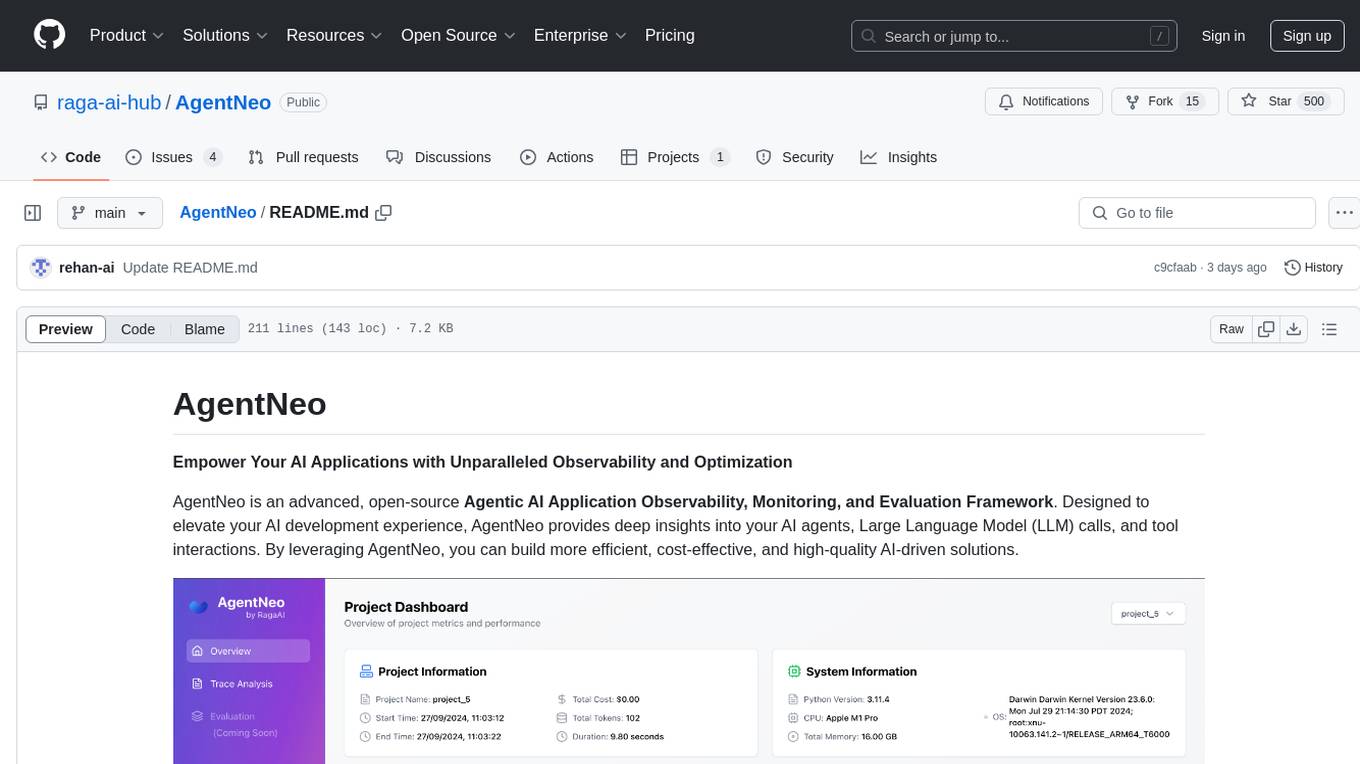
AgentNeo
AgentNeo is an advanced, open-source Agentic AI Application Observability, Monitoring, and Evaluation Framework designed to provide deep insights into AI agents, Large Language Model (LLM) calls, and tool interactions. It offers robust logging, visualization, and evaluation capabilities to help debug and optimize AI applications with ease. With features like tracing LLM calls, monitoring agents and tools, tracking interactions, detailed metrics collection, flexible data storage, simple instrumentation, interactive dashboard, project management, execution graph visualization, and evaluation tools, AgentNeo empowers users to build efficient, cost-effective, and high-quality AI-driven solutions.
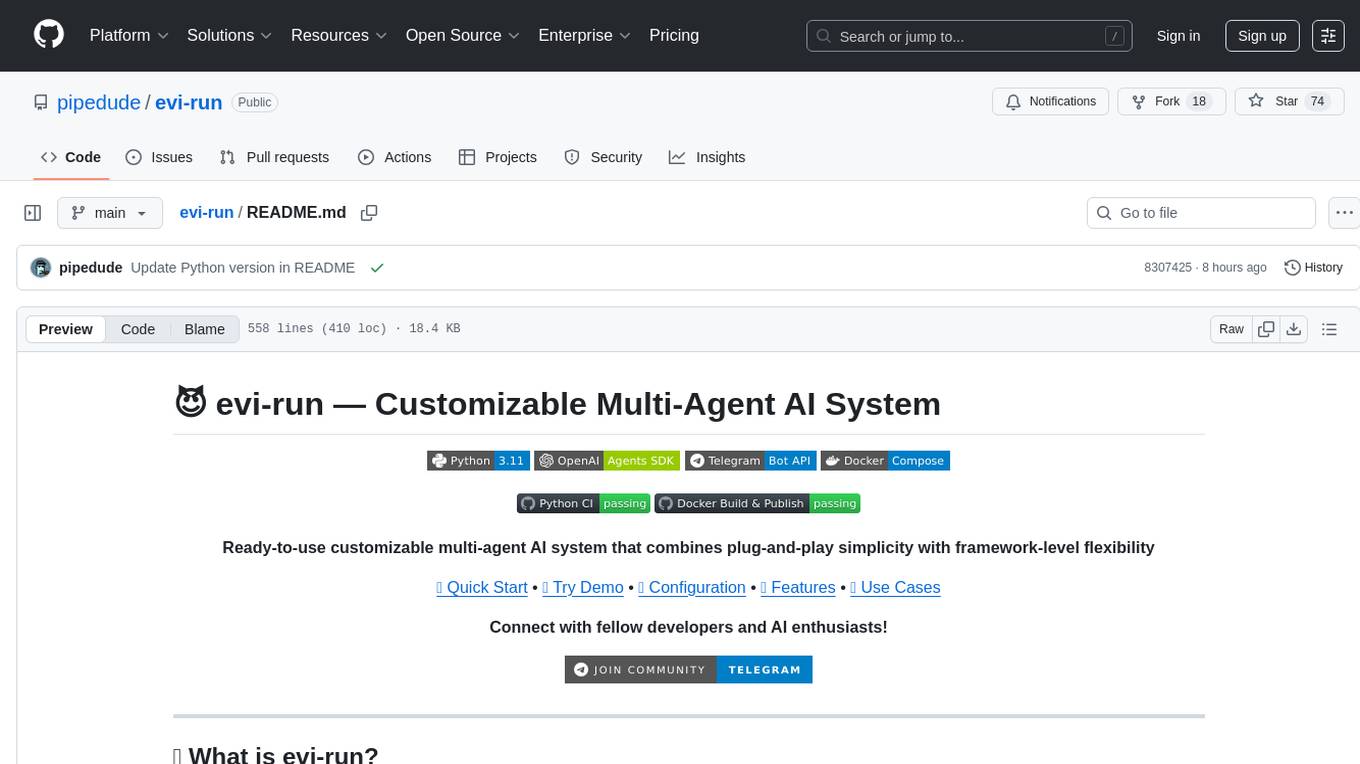
evi-run
evi-run is a powerful, production-ready multi-agent AI system built on Python using the OpenAI Agents SDK. It offers instant deployment, ultimate flexibility, built-in analytics, Telegram integration, and scalable architecture. The system features memory management, knowledge integration, task scheduling, multi-agent orchestration, custom agent creation, deep research, web intelligence, document processing, image generation, DEX analytics, and Solana token swap. It supports flexible usage modes like private, free, and pay mode, with upcoming features including NSFW mode, task scheduler, and automatic limit orders. The technology stack includes Python 3.11, OpenAI Agents SDK, Telegram Bot API, PostgreSQL, Redis, and Docker & Docker Compose for deployment.
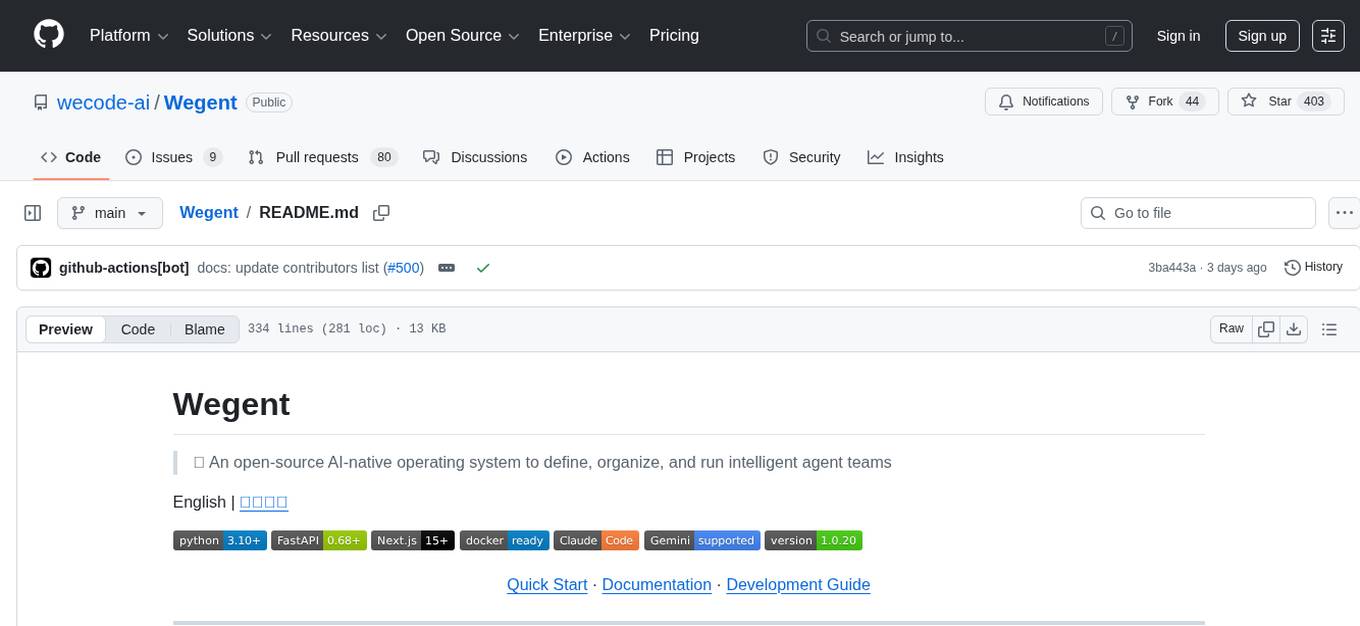
Wegent
Wegent is an open-source AI-native operating system designed to define, organize, and run intelligent agent teams. It offers various core features such as a chat agent with multi-model support, conversation history, group chat, attachment parsing, follow-up mode, error correction mode, long-term memory, sandbox execution, and extensions. Additionally, Wegent includes a code agent for cloud-based code execution, AI feed for task triggers, AI knowledge for document management, and AI device for running tasks locally. The platform is highly extensible, allowing for custom agents, agent creation wizard, organization management, collaboration modes, skill support, MCP tools, execution engines, YAML config, and an API for easy integration with other systems.
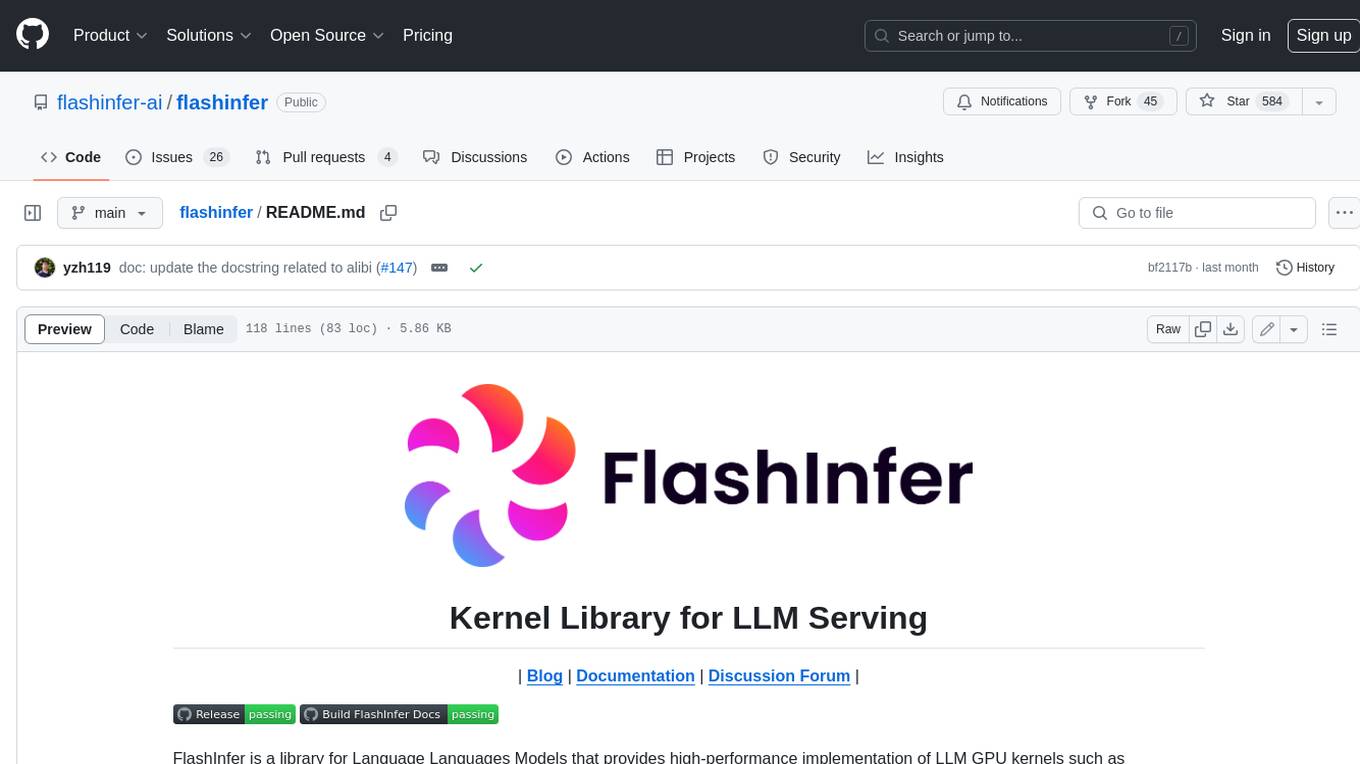
flashinfer
FlashInfer is a library for Language Languages Models that provides high-performance implementation of LLM GPU kernels such as FlashAttention, PageAttention and LoRA. FlashInfer focus on LLM serving and inference, and delivers state-the-art performance across diverse scenarios.
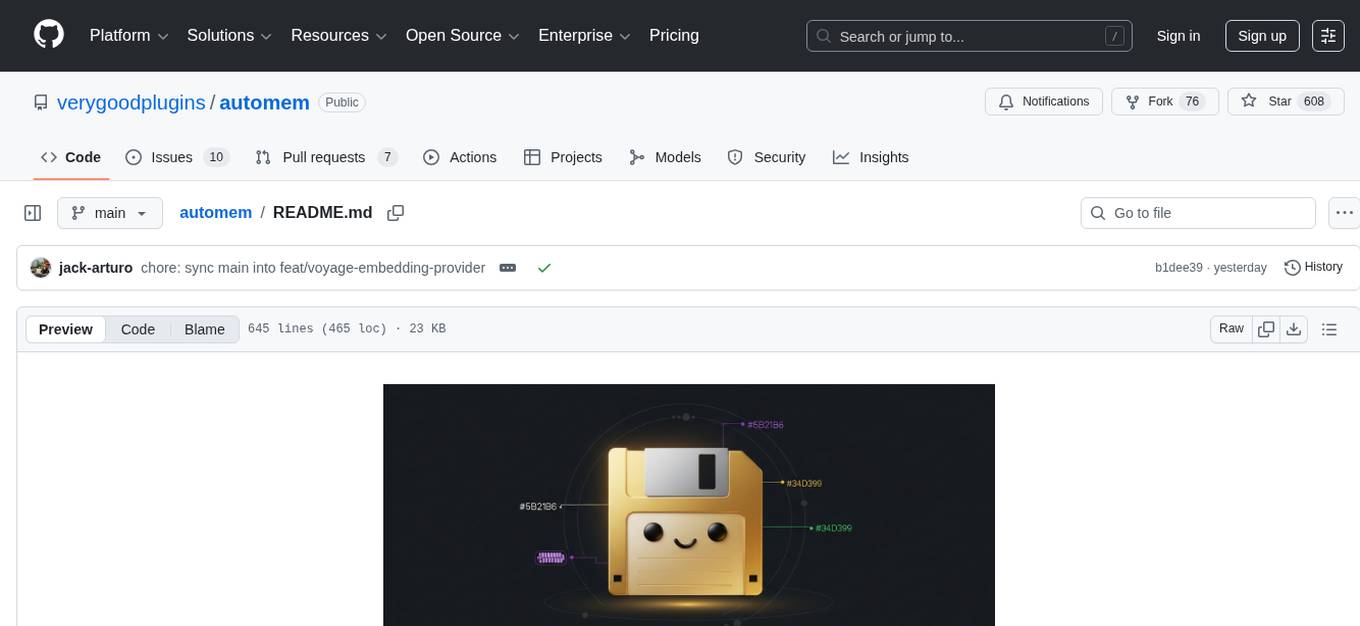
automem
AutoMem is a production-grade long-term memory system for AI assistants, achieving 90.53% accuracy on the LoCoMo benchmark. It combines FalkorDB (Graph) and Qdrant (Vectors) storage systems to store, recall, connect, learn, and perform with memories. AutoMem enables AI assistants to remember, connect, and evolve their understanding over time, similar to human long-term memory. It implements techniques from peer-reviewed memory research and offers features like multi-hop bridge discovery, knowledge graphs that evolve, 9-component hybrid scoring, memory consolidation cycles, background intelligence, 11 relationship types, and more. AutoMem is benchmark-proven, research-validated, and production-ready, with features like sub-100ms recall, concurrent writes, automatic retries, health monitoring, dual storage redundancy, and automated backups.
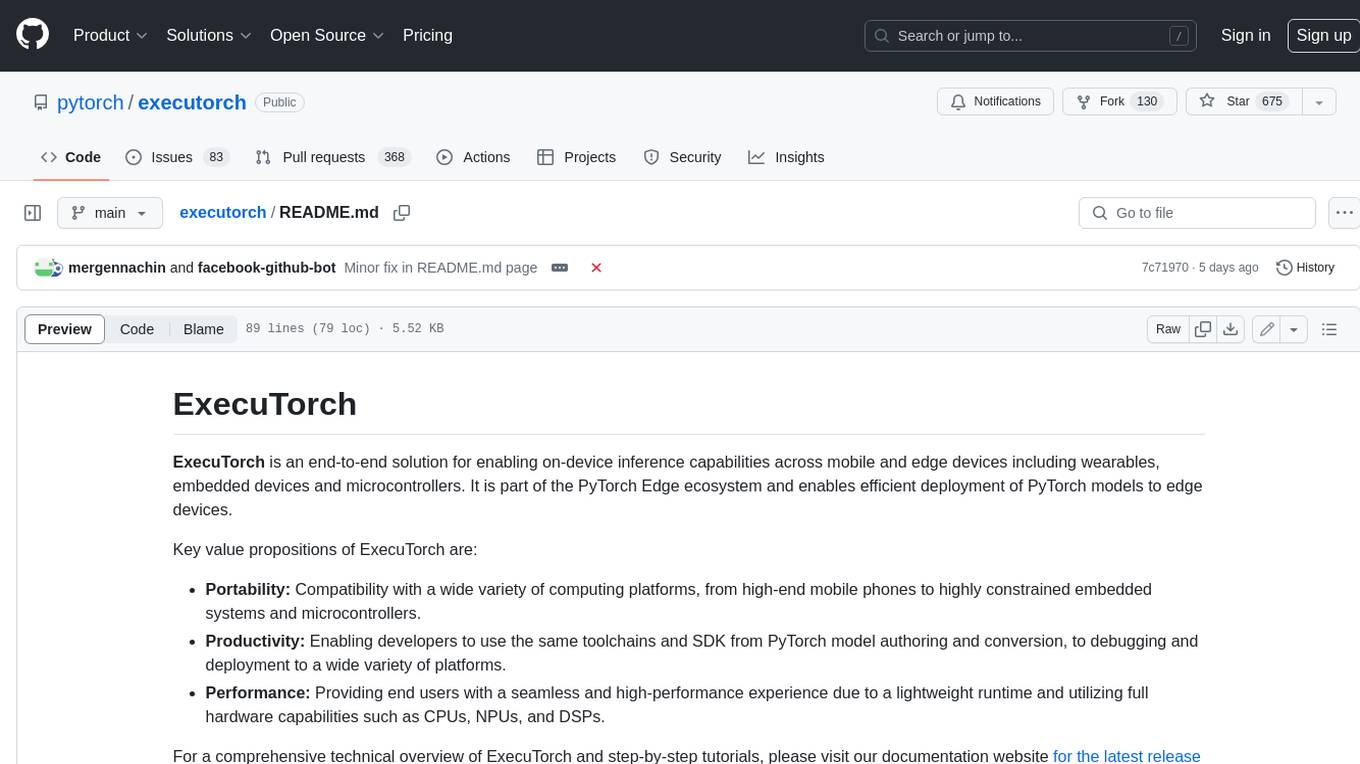
executorch
ExecuTorch is an end-to-end solution for enabling on-device inference capabilities across mobile and edge devices including wearables, embedded devices and microcontrollers. It is part of the PyTorch Edge ecosystem and enables efficient deployment of PyTorch models to edge devices. Key value propositions of ExecuTorch are: * **Portability:** Compatibility with a wide variety of computing platforms, from high-end mobile phones to highly constrained embedded systems and microcontrollers. * **Productivity:** Enabling developers to use the same toolchains and SDK from PyTorch model authoring and conversion, to debugging and deployment to a wide variety of platforms. * **Performance:** Providing end users with a seamless and high-performance experience due to a lightweight runtime and utilizing full hardware capabilities such as CPUs, NPUs, and DSPs.
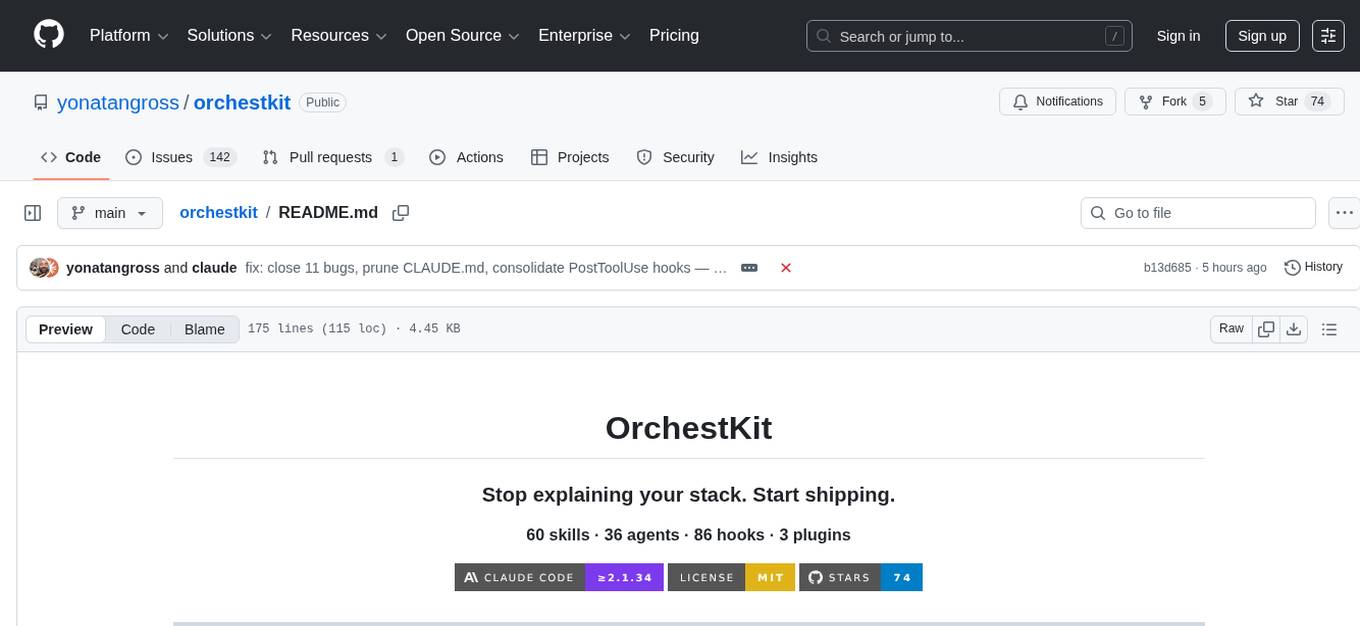
orchestkit
OrchestKit is a powerful and flexible orchestration tool designed to streamline and automate complex workflows. It provides a user-friendly interface for defining and managing orchestration tasks, allowing users to easily create, schedule, and monitor workflows. With support for various integrations and plugins, OrchestKit enables seamless automation of tasks across different systems and applications. Whether you are a developer looking to automate deployment processes or a system administrator managing complex IT operations, OrchestKit offers a comprehensive solution to simplify and optimize your workflow management.
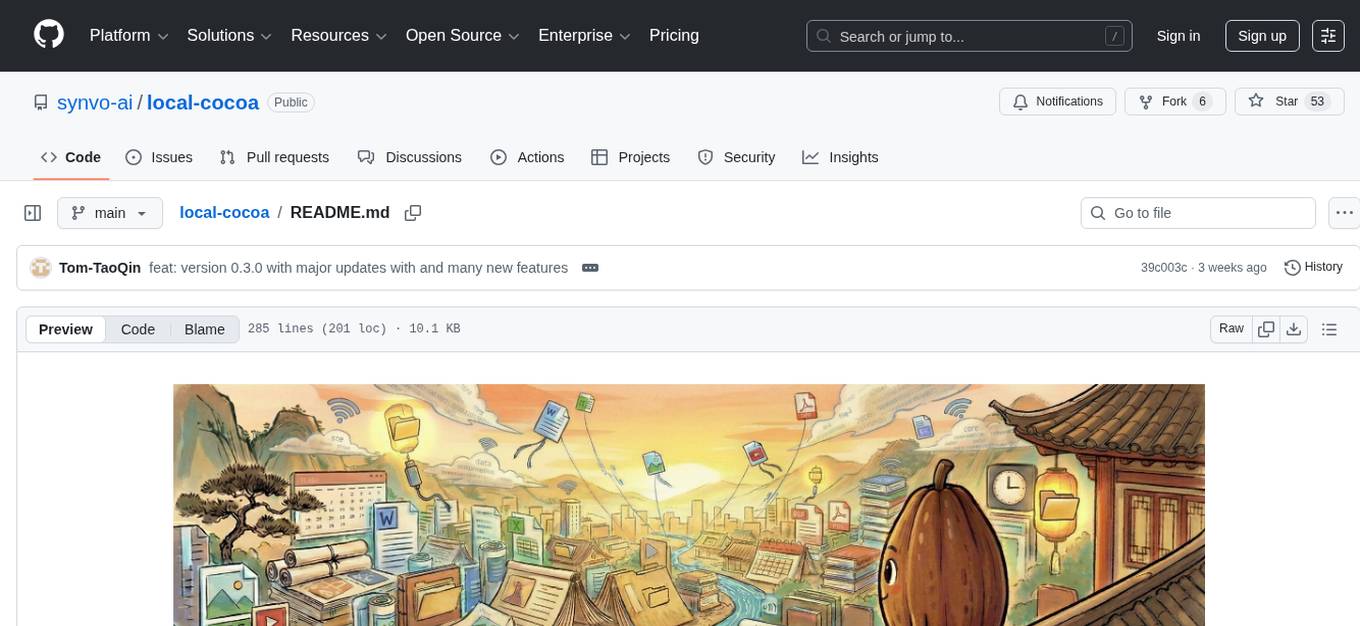
local-cocoa
Local Cocoa is a privacy-focused tool that runs entirely on your device, turning files into memory to spark insights and power actions. It offers features like fully local privacy, multimodal memory, vector-powered retrieval, intelligent indexing, vision understanding, hardware acceleration, focused user experience, integrated notes, and auto-sync. The tool combines file ingestion, intelligent chunking, and local retrieval to build a private on-device knowledge system. The ultimate goal includes more connectors like Google Drive integration, voice mode for local speech-to-text interaction, and a plugin ecosystem for community tools and agents. Local Cocoa is built using Electron, React, TypeScript, FastAPI, llama.cpp, and Qdrant.
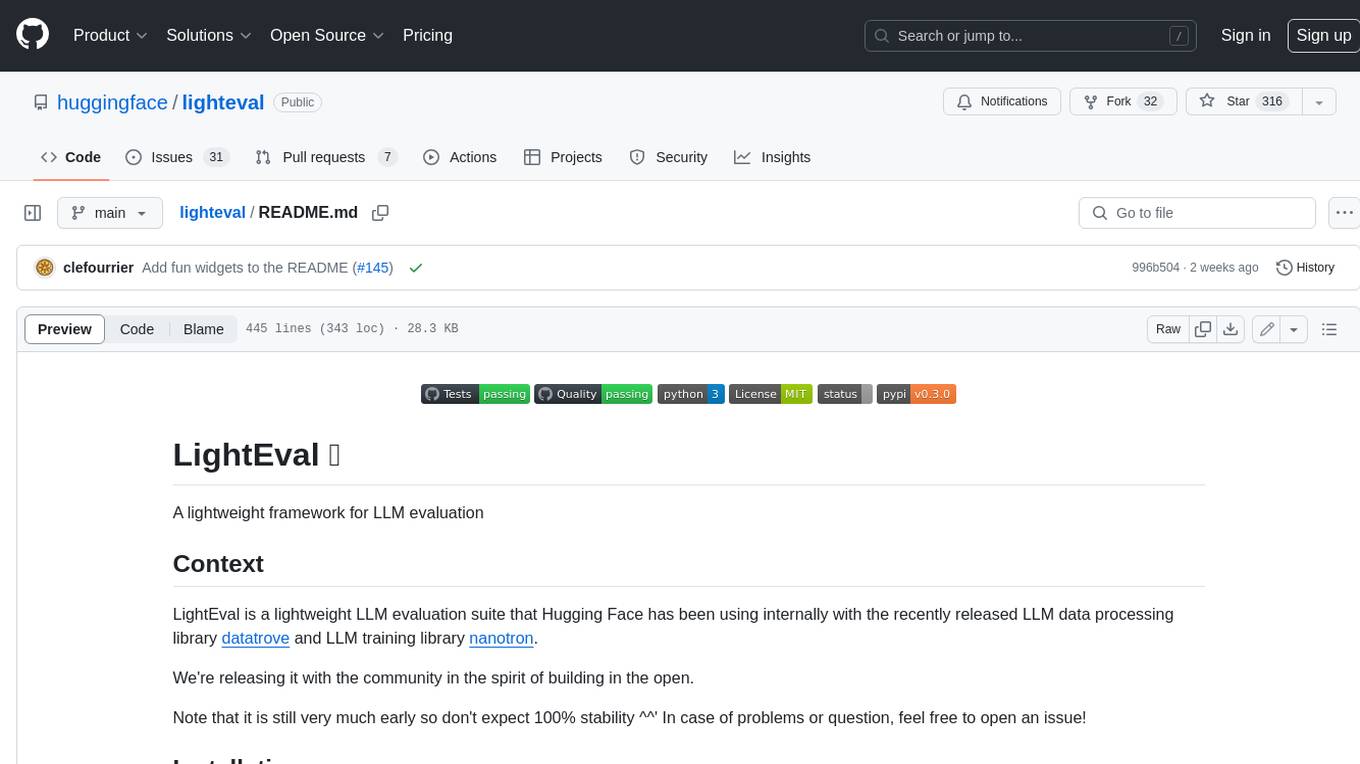
lighteval
LightEval is a lightweight LLM evaluation suite that Hugging Face has been using internally with the recently released LLM data processing library datatrove and LLM training library nanotron. We're releasing it with the community in the spirit of building in the open. Note that it is still very much early so don't expect 100% stability ^^' In case of problems or question, feel free to open an issue!
For similar tasks
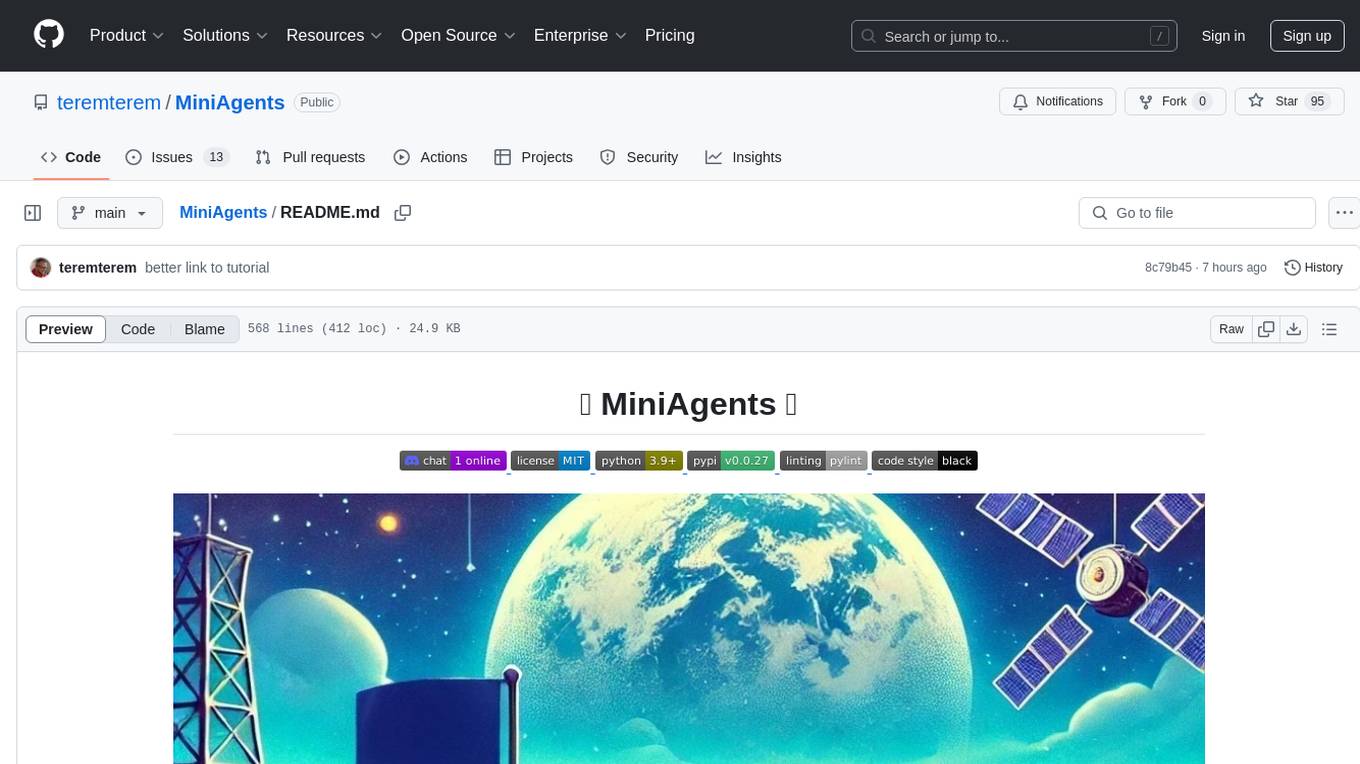
MiniAgents
MiniAgents is an open-source Python framework designed to simplify the creation of multi-agent AI systems. It offers a parallelism and async-first design, allowing users to focus on building intelligent agents while handling concurrency challenges. The framework, built on asyncio, supports LLM-based applications with immutable messages and seamless asynchronous token and message streaming between agents.

AutoAgents
AutoAgents is a cutting-edge multi-agent framework built in Rust that enables the creation of intelligent, autonomous agents powered by Large Language Models (LLMs) and Ractor. Designed for performance, safety, and scalability. AutoAgents provides a robust foundation for building complex AI systems that can reason, act, and collaborate. With AutoAgents you can create Cloud Native Agents, Edge Native Agents and Hybrid Models as well. It is so extensible that other ML Models can be used to create complex pipelines using Actor Framework.
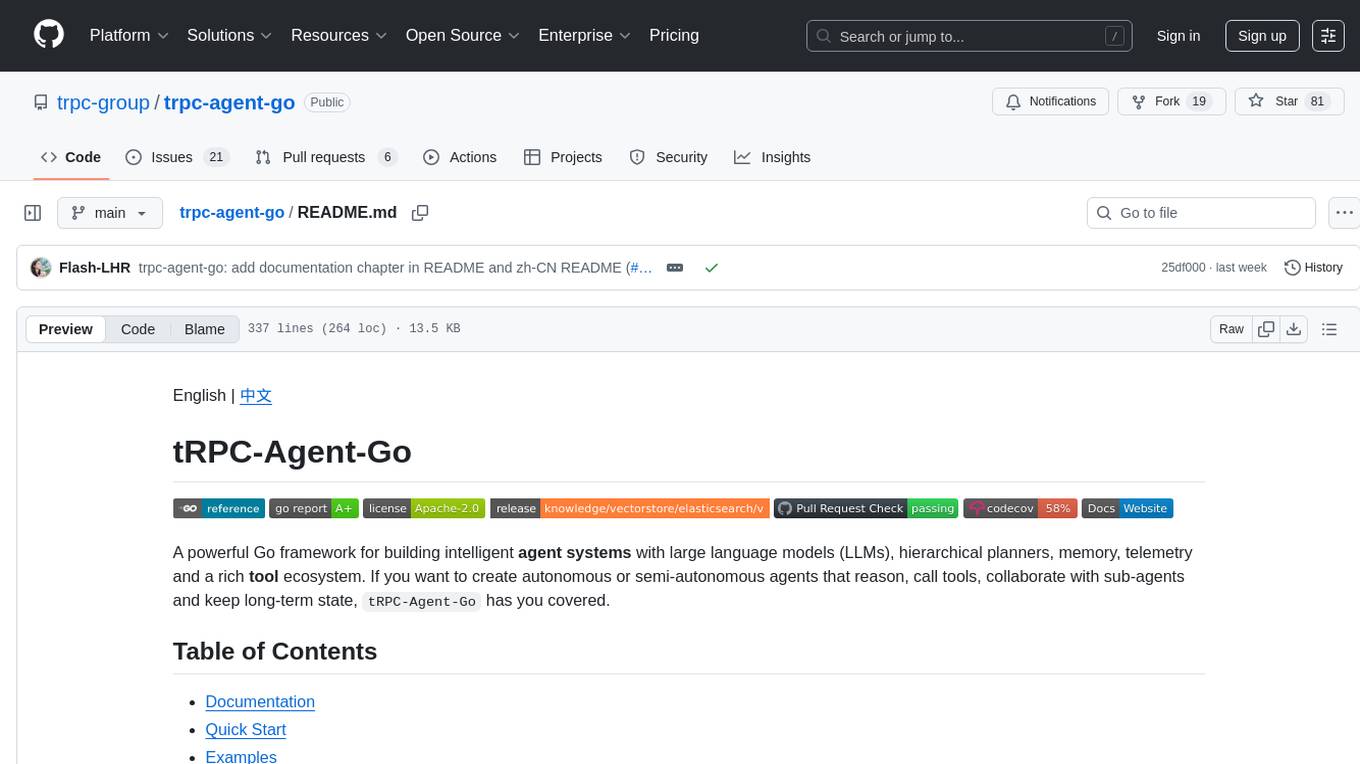
trpc-agent-go
A powerful Go framework for building intelligent agent systems with large language models (LLMs), hierarchical planners, memory, telemetry, and a rich tool ecosystem. tRPC-Agent-Go enables the creation of autonomous or semi-autonomous agents that reason, call tools, collaborate with sub-agents, and maintain long-term state. The framework provides detailed documentation, examples, and tools for accelerating the development of AI applications.
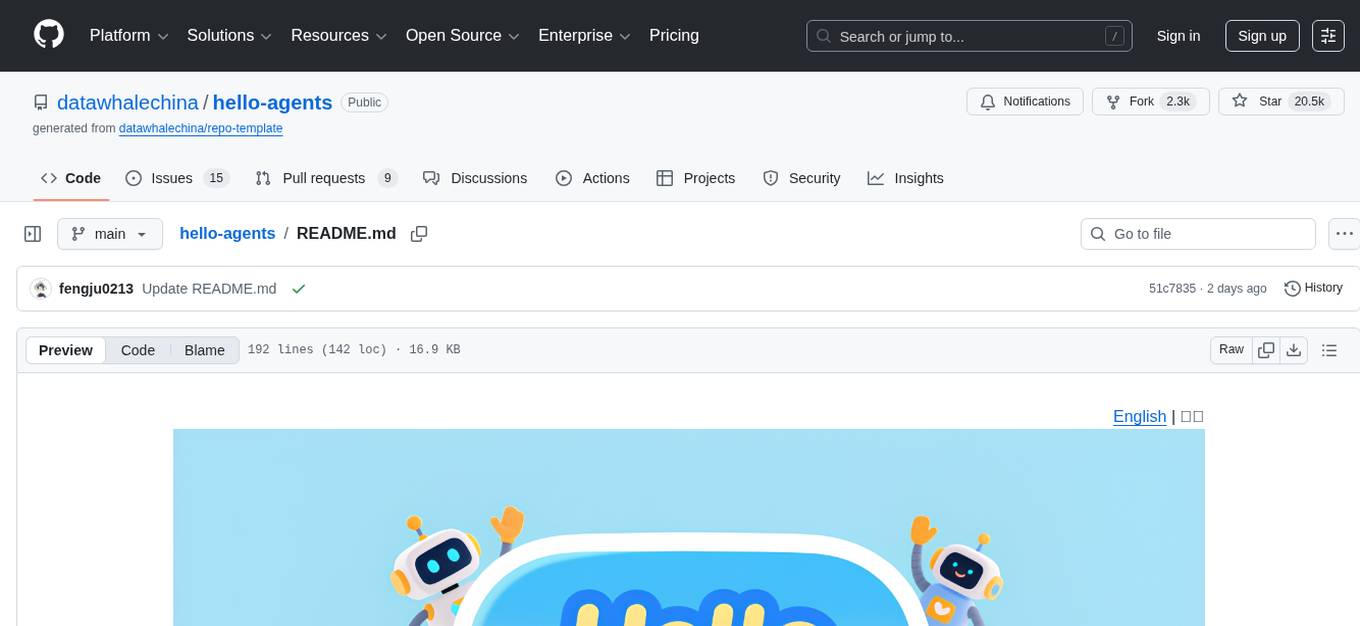
hello-agents
Hello-Agents is a comprehensive tutorial on building intelligent agent systems, covering both theoretical foundations and practical applications. The tutorial aims to guide users in understanding and building AI-native agents, diving deep into core principles, architectures, and paradigms of intelligent agents. Users will learn to develop their own multi-agent applications from scratch, gaining hands-on experience with popular low-code platforms and agent frameworks. The tutorial also covers advanced topics such as memory systems, context engineering, communication protocols, and model training. By the end of the tutorial, users will have the skills to develop real-world projects like intelligent travel assistants and cyber towns.
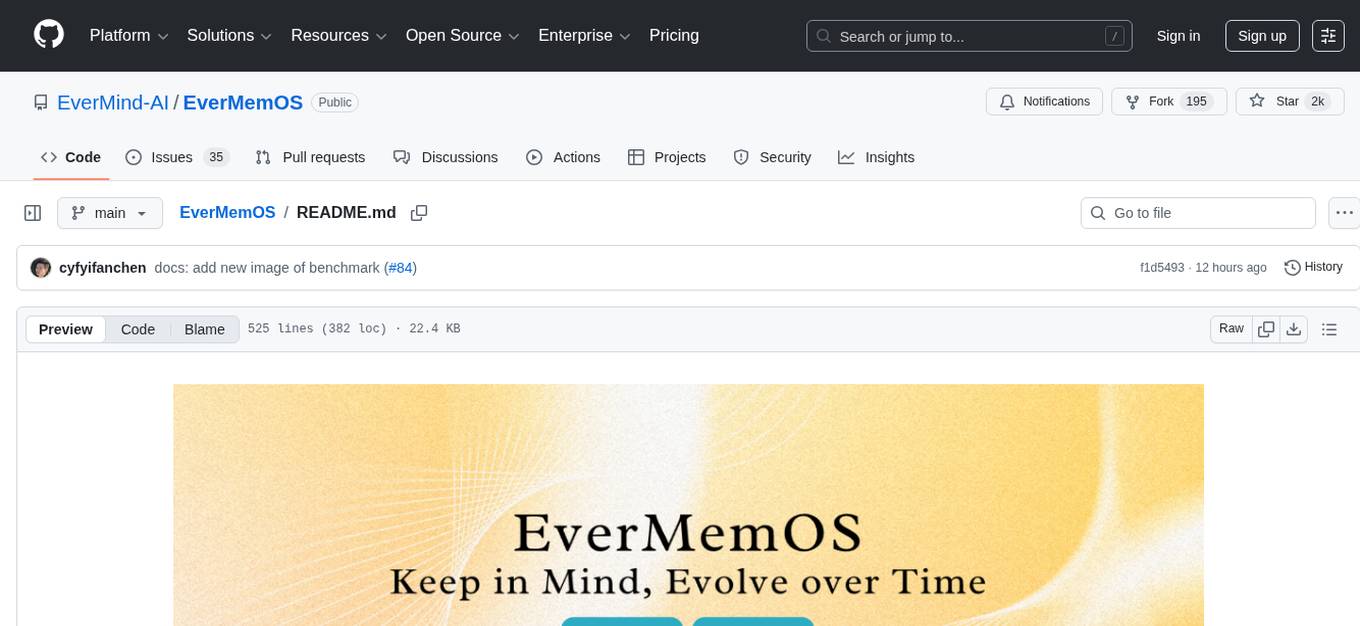
EverMemOS
EverMemOS is an AI memory system that enables AI to not only remember past events but also understand the meaning behind memories and use them to guide decisions. It achieves 93% reasoning accuracy on the LoCoMo benchmark by providing long-term memory capabilities for conversational AI agents through structured extraction, intelligent retrieval, and progressive profile building. The tool is production-ready with support for Milvus vector DB, Elasticsearch, MongoDB, and Redis, and offers easy integration via a simple REST API. Users can store and retrieve memories using Python code and benefit from features like multi-modal memory storage, smart retrieval mechanisms, and advanced techniques for memory management.
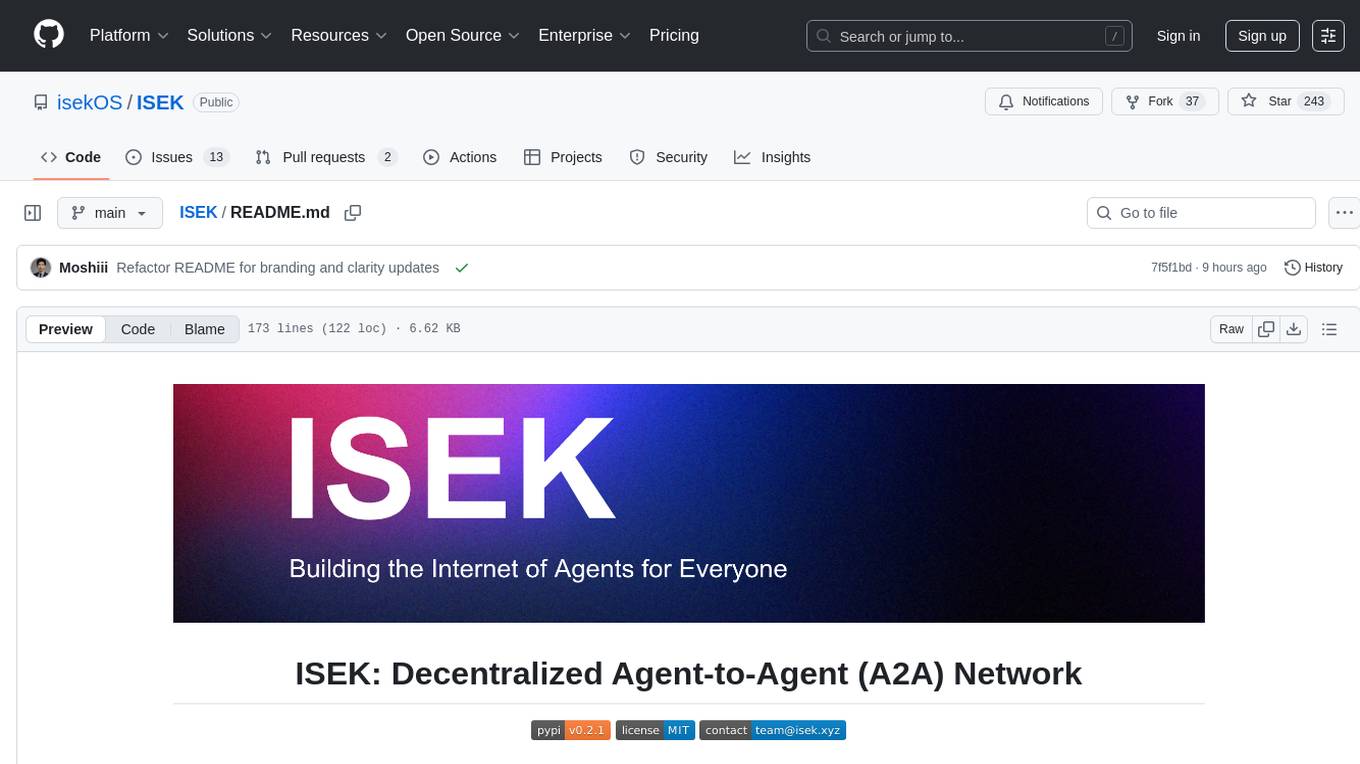
ISEK
ISEK is a decentralized agent network framework that enables building intelligent, collaborative agent-to-agent systems. It integrates the Google A2A protocol and ERC-8004 contracts for identity registration, reputation building, and cooperative task-solving, creating a self-organizing, decentralized society of agents. The platform addresses challenges in the agent ecosystem by providing an incentive system for users to pay for agent services, motivating developers to build high-quality agents and fostering innovation and quality in the ecosystem. ISEK focuses on decentralized agent collaboration and coordination, allowing agents to find each other, reason together, and act as a decentralized system without central control. The platform utilizes ERC-8004 for decentralized identity, reputation, and validation registries, establishing trustless verification and reputation management.
For similar jobs

sweep
Sweep is an AI junior developer that turns bugs and feature requests into code changes. It automatically handles developer experience improvements like adding type hints and improving test coverage.

teams-ai
The Teams AI Library is a software development kit (SDK) that helps developers create bots that can interact with Teams and Microsoft 365 applications. It is built on top of the Bot Framework SDK and simplifies the process of developing bots that interact with Teams' artificial intelligence capabilities. The SDK is available for JavaScript/TypeScript, .NET, and Python.

ai-guide
This guide is dedicated to Large Language Models (LLMs) that you can run on your home computer. It assumes your PC is a lower-end, non-gaming setup.

classifai
Supercharge WordPress Content Workflows and Engagement with Artificial Intelligence. Tap into leading cloud-based services like OpenAI, Microsoft Azure AI, Google Gemini and IBM Watson to augment your WordPress-powered websites. Publish content faster while improving SEO performance and increasing audience engagement. ClassifAI integrates Artificial Intelligence and Machine Learning technologies to lighten your workload and eliminate tedious tasks, giving you more time to create original content that matters.

chatbot-ui
Chatbot UI is an open-source AI chat app that allows users to create and deploy their own AI chatbots. It is easy to use and can be customized to fit any need. Chatbot UI is perfect for businesses, developers, and anyone who wants to create a chatbot.

BricksLLM
BricksLLM is a cloud native AI gateway written in Go. Currently, it provides native support for OpenAI, Anthropic, Azure OpenAI and vLLM. BricksLLM aims to provide enterprise level infrastructure that can power any LLM production use cases. Here are some use cases for BricksLLM: * Set LLM usage limits for users on different pricing tiers * Track LLM usage on a per user and per organization basis * Block or redact requests containing PIIs * Improve LLM reliability with failovers, retries and caching * Distribute API keys with rate limits and cost limits for internal development/production use cases * Distribute API keys with rate limits and cost limits for students

uAgents
uAgents is a Python library developed by Fetch.ai that allows for the creation of autonomous AI agents. These agents can perform various tasks on a schedule or take action on various events. uAgents are easy to create and manage, and they are connected to a fast-growing network of other uAgents. They are also secure, with cryptographically secured messages and wallets.

griptape
Griptape is a modular Python framework for building AI-powered applications that securely connect to your enterprise data and APIs. It offers developers the ability to maintain control and flexibility at every step. Griptape's core components include Structures (Agents, Pipelines, and Workflows), Tasks, Tools, Memory (Conversation Memory, Task Memory, and Meta Memory), Drivers (Prompt and Embedding Drivers, Vector Store Drivers, Image Generation Drivers, Image Query Drivers, SQL Drivers, Web Scraper Drivers, and Conversation Memory Drivers), Engines (Query Engines, Extraction Engines, Summary Engines, Image Generation Engines, and Image Query Engines), and additional components (Rulesets, Loaders, Artifacts, Chunkers, and Tokenizers). Griptape enables developers to create AI-powered applications with ease and efficiency.


